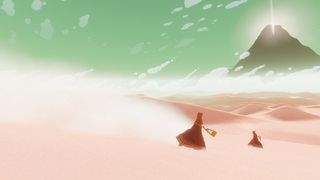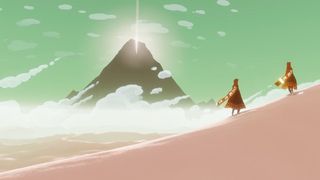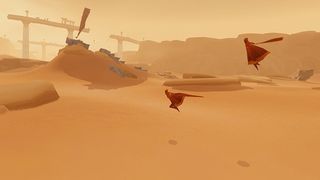Many games seek to satisfy your id through huge amounts of violence. They allow players to commit countless acts of brutality. Everything from military battles to senseless slaughter of innocents to simply screwing with the on-screen AI is available to players whenever they want. And, seemingly, that's what players eat up. So, when a game looks to take a non-violent approach to satisfying the player's most primal urges, it's important to stand up and take note. Thatgamecompany's most recent attempt, Journey, seeks to do just that.

One of the first things you'll notice when exploring Journey's vast desert is the pleasure of movement. Everything from sliding down steep dunes to gliding is smooth, joyous, and playful, making the long trip towards the ever-dominant mountain in the distance really quite fun. Inspired by a trip to the Pismo Beach dunes on the California coast, Thatgamecompany co-founder Kellee Santiago calls the feelings gained through play as "fundamental to this experience of being in the desert," and that's certainly true. Walking up a huge dune is tough work, and you feel it as your unnamed robed character struggles to make it up. However, once he reaches the top, simply sliding down is its own reward.
Thatgamecompany's previous games Fl0w and Flower are full of life and have themes of healing and evolution, and despite its desert setting, Journey is no different. Santiago says that "If Fl0w was a haiku, and Flower was a poem, then we've been thinking of Journey as a parable." And that shows. Just under the facade of the desert lies a living, fluid world. With each step, the sand ripples like water, implying that the most important element to life is a strong thematic element. What's more, living ribbons inhabit the world. At first, they're little more than strips of fabric floating around and giving the player the ability to jump. Later, you'll encounter more evolved "life" forms that play like sea creatures, diving into the sand, jumping, and occasionally carrying you along as if they're dolphins pushing you with their noses.

"Players will recognize similar themes as in our previous titles, but we have further elaboration and story in this title," Santiago explains. That story is told through brief cutscenes that look like cave drawings, showing the tragic death of an entire people. Quickly you realize that the Journey isn't about getting to the mountain - it's about learning what happened to these people and what your place in this world actually is. As you explore, more and more graves appear, especially around ruins of huge buildings, implying that this race of people had something to do with their own demise. Considering the themes of destruction of nature in Flower, we don't think that assessment would be too far off the mark.
You're not alone in your trip, however. Occasionally, you'll come across another player in the world. You'll have no real way to communicate, no way to find their name, and no way to even invite your friends into the game with you. It's a true passing of souls. In this way, Thatgamecompany seeks to make the interactions as human as possible. They do away with the game elements; they hope to make it like two people passing each other on a hike. You know very little about one another and are only bound by your trip and your mutual exploration of this natural space. That feeling is extremely organic and results in some very interesting interactions. When we passed a fellow player, we traded little songs with the singing button (one of two abilities we saw, the other being the ability to jump). It feels very much like a conversation, even if nothing is really being said. According to Executive Producer Robin Hunicke, this isn't out of the ordinary, nor is it very common. Some people are a "little more singsong-y than others, while others will maybe do one or two things together and walk apart" she said.

In all these ways, they're attempting to get rid of the gaminess of it all, and causing players to get back to being human. "You get back to that singular approach to being with another person" as a result of their approach to telling the story of this ruined world, Hunicke said. Journey is that rare sort of title that's attempting to speak to the human condition and explore what it means to both interact with another person and being truly alone in the world. And it's setting itself up to be something extremely special.
Jun 9, 2011
